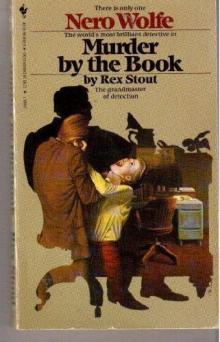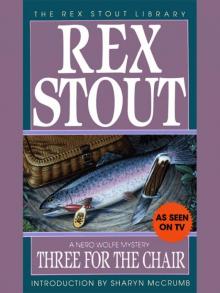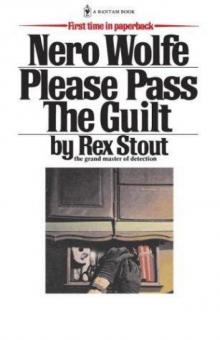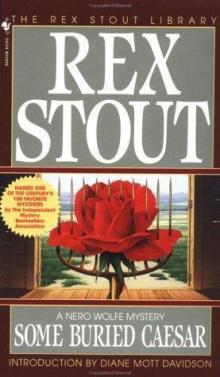Rex stout nero wolfe 2.., p.1
Rex Stout - Nero Wolfe 26 - Might As Well Be Dead, page 1
part #26 of Nero Wolfe Series





Rex Stout
REX STOUT, the creator of Nero Wolfe, was born in Noblesville, Indiana, in 1886, the sixth of nine children of John and Lucetta Todhunter Stout, both Quakers. Shortly after his birth the family moved to Wakarusa, Kansas. He was educated in a country school, but by the age of nine he was recognized throughout the state as a prodigy in arithmetic. Mr. Stout briefly attended the University of Kansas, but he left to enlist in the Navy and spent the next two years as a warrant officer on board President Theodore Roosevelt’s yacht. When he left the Navy in 1908, Rex Stout began to write freelance articles and worked as a sightseeing guide and an itinerant bookkeeper. Later he devised and implemented a school banking system which was installed in four hundred cities and towns throughout the country. In 1927 Mr. Stout retired from the world of finance and, with the proceeds of his banking scheme, left for Paris to write serious fiction. He wrote three novels that received favorable reviews before turning to detective fiction. His first Nero Wolfe novel, Fer-de-Lance, appeared in 1934. It was followed by many others, among them, Too Many Cooks, The Silent Speaker, If Death Ever Slept, The Doorbell Rang, and Please Pass the Guilt, which established Nero Wolfe as a leading character on a par with Erle Stanley Gardner’s famous protagonist, Perry Mason. During World War II Rex Stout waged a personal campaign against Nazism as chairman of the War Writers’ Board, master of ceremonies of the radio program “Speaking of Liberty,” and member of several national committees. After the war he turned his attention to mobilizing public opinion against the wartime use of thermonuclear devices, was an active leader in the Authors’ Guild, and resumed writing his Nero Wolfe novels. Rex Stout died in 1975 at the age of eighty-eight. A month before his death he published his seventy-second Nero Wolfe mystery, A Family Affair. Ten years later, a seventy-third Nero Wolfe mystery was discovered and published in Death Times Three.
The Rex Stout Library
Fer-de-Lance
The League of Frightened Men
The Rubber Band
The Red Box
Too Many Cooks
Some Buried Caesar
Over My Dead Body
Where There’s a Will
Black Orchids
Not Quite Dead Enough
The Silent Speaker
Too Many Women
And Be a Villain
The Second Confession
Trouble in Triplicate
In the Best Families
Three Doors to Death
Murder by the Book
Curtains for Three
Prisoner’s Base
Triple Jeopardy
The Golden Spiders
The Black Mountain
Three Men Out
Before Midnight
Might As Well Be Dead
Three Witnesses
If Death Ever Slept
Three for the Chair
Champagne for One
And Four to Go
Plot It Yourself
Too Many Clients
Three at Wolfe’s Door
The Final Deduction
Gambit
Homicide Trinity
The Mother Hunt
A Right to Die
Trio for Blunt Instruments
The Doorbell Rang
Death of a Doxy
The Father Hunt
Death of a Dude
Please Pass the Guilt
A Family Affair
Death Times Three
The Hand in the Glove
Double for Death
Bad for Business
The Broken Vase
The Sound of Murder
Red Threads
The Mountain Cat Murders
Introduction
A few years back, perhaps a decade or so, I first heard the phrase “psychological suspense” used to describe a genre of books that had greater pretenses than could be accomodated by the plebeian moniker “mystery.” Generally speaking, these books are notable for characters who carry angst and automatic pistols and serial killers of ever-increasing depravity and ingenuity.
The distinction between the two descriptions, I suppose, is that “psychological suspense” novels are exercises where good guys and bad guys are clearly delineated from the get-go, even if the good guy isn’t quite so good and the bad guy is a whole lot worse than one could have imagined in any current nightmare. The reader can always trust that the bad guy will transcend bad so far that any weaknesses on the part of his good counterpart are quickly ignored. These novels very rarely rely on the traditional “mystery” form, where the reader, following the intuitive trail of the detective, discovers in a more subtle and often surprising way where evil truly lies.
Personally, I’ve always thought this attempt to gentrify one type of novel at the expense of another, bunk. All good novels of crime should be mysterious. Questions of where, when, how, and ultimately whodunit, are only underscored when the further element of whydunit is added to the mix.
Which brings me, in a roundabout fashion, to Rex Stout and his famous character, Nero Wolfe. These titles, being reissued now, are “mysteries” in the traditional sense of the word. There is a crime, or series of crimes; it is unclear who has or is performing them, or why; there is a solution, which intrigues us readers because it is clever, chilling, and often a window onto the weaknesses and frailties of humankind.
The psychological acumen that Stout brings to Wolfe’s solutions is far more sophisticated than that which is displayed in today’s common “psychological suspense” novels. Maybe a bit less bloody (perhaps), but immensely more subtle. Wolfe probes personalities until he uncovers the nasty vein that pulses beneath the surface, regardless of how well hidden it might be. In actuality, almost all the real “action” of a Nero Wolfe novel is cerebral.
This, of course, is necessary, because, after all, Nero Wolfe is the very definition of a man who relies on his head to fathom crime. He doesn’t venture out of doors. He resists the intrusions of modern life with a steadfastness that, in this day and age of fax machines, cellular telephones, and 112-station cable television sets, is admirable. He prefers his plants and his gourmet meals. No world-weary street-smarts for Wolfe. He employs people to develop those attributes. No, Wolfe exists solely for the chase, which takes place on a uniquely psychological landscape. He listens (a lost ability in these times). He assesses. He deduces. He intuits. He investigates with a draughtsman’s precision and a psychiatrist’s intellectual scalpel.
Consider, for a moment, the title to this particular mystery: “Might As Well Be Dead.” This is a familiar, if not common, phrase. It is usually spoken with a jocularity that implies that the speaker doesn’t take his or her thought completely seriously, for, in reality, it is an awful idea, that events could descend upon an individual with such harshness that their life now resembles the coldness that we assume death to be. So, the phrase, when uttered with a singular sadness and despair, takes on a frightening weight. And that is precisely what spirits Nero Wolfe into this tale.
Before it is over, there will be a few bodies littering the literary horizon, and many things will not be as they first appear. Guilt and innocence will change places a few times. Like the proverbial jigsaw puzzle, facts, events, suppositions and evidence will all coalesce in a clever, provocative way. A Nero Wolfe novel is something akin to watching a chess match, but one where the rooks and pawns are real characters, and the stakes are considerably higher.
It is all handled with wit and verve. In this era where it seems sometimes that body-count is more important than style and where a cruel bloodthirst seems to dominate contemporary crime fiction (alas, I am probably guilty of adding a few titles to the list that fit this description), the reemergence of Nero Wolfe, with his carefully nurtured and coddled plants and dangerous, ever-expanding waistline, is a welcome respite from the harshness that seems to have overtaken the genre—regardless of whether one wants to call it a “mystery” or a novel of “psychological suspense.”
—John Katzenbach
Chapter 1
Most of the people who come to see Nero Wolfe by appointment, especially from as far away as Nebraska, show some sign of being in trouble, but that one didn’t. With his clear unwrinkled skin and alert brown eyes and thin straight mouth, he didn’t even look his age. I knew his age, sixty-one. When a telegram had come from James R. Herold, Omaha, Nebraska, asking for an appointment Monday afternoon, of course I had checked on him. He was sole owner of the Herold Hardware Company, wholesale, a highly respected citizen, and rated at over half a million—a perfect prospect for a worthy fee if he had real trouble. Seeing him had been a letdown. From his looks, he might merely be after a testimonial for a gadget to trim orchid plants. He had settled back comfortably in the red leather chair.
“I guess,” he said, “I’d better tell you why I picked you.”
“As you please,” Wolfe muttered from behind his desk. For half an hour after lunch he never gets above a mutter unless he has to.
Herold crossed his legs. “It’s about my son. I want to find my son. About a month ago I put ads in the New York papers, and I contacted the New York police, and—What’s the matter?”
“Nothing. Go on.”
It was not nothing. Wolfe had made a face. I, at my desk, could have told Herold that unless his problem smelled like real money he might as well quit right there. One man who had made “contact” a verb in that office had paid an extr
Herold looked doubtful; then his face cleared. “Oh. You don’t like poking in a police matter, but that’s all right. I’ve been keeping after the Missing Persons Bureau, a Lieutenant Murphy, and I’ve run some more newspaper ads in the Personals, but they’ve got no results at all, and my wife was getting impatient about it, so I phoned Lieutenant Murphy from Omaha and told him I wanted to hire a private detective agency and asked him to recommend one. He said he couldn’t do that, but I can be pretty determined when I want to, and he gave me your name. He said that on a job like finding a missing person you yourself wouldn’t be much because you were too fat and lazy, but that you had two men, one named Archie Goodwin and one named Saul Panzer, who were tops for that kind of work. So I wired you for an appointment.”
Wolfe made the noise he uses for a chuckle, and moved a finger to indicate me. “This is Mr. Goodwin. Tell him about it.”
“He’s in your employ, isn’t he?”
“Yes. My confidential assistant.”
“Then I’ll tell you. I like to deal with principals. My son Paul is my only son—I have two daughters. When he graduated from college, the University of Nebraska, I took him into my business, wholesale hardware. That was in nineteen forty-five, eleven years ago. He had been a little wild in college, but I thought he would settle into the harness, but he didn’t. He stole twenty-six thousand dollars of the firm’s money, and I kicked him out.” His straight thin mouth tightened a little. “Out of the business and out of the house. He left Omaha and I never saw him again. I didn’t want to see him, but now I do and my wife does. One month ago, on March eighth, I learned that he didn’t take that money. I learned who did, and it has been proven beyond all doubt. That’s being attended to, the thief is being taken care of, and now I want to find my son.” He got a large envelope from his pocket, took things from it, and left his chair. “That’s a picture of him, taken in June nineteen forty-five, the latest one I have.” He handed me one too. “Here are six copies of it, and of course I can get more.” He returned to the chair and sat. “He got a raw deal and I want to make it square with him. I have nothing to apologize for, because at the time there was good evidence that he had taken the money, but now I know he didn’t and I’ve got to find him. My wife is very impatient about it.”
The picture was of a round-cheeked kid in a mortarboard and gown, with a dimple in his chin. No visible resemblance to his father. As for the father, he certainly wasn’t being maudlin. You could say he was bearing up well in the circumstances, or you could say he was plain cold fish. I preferred the latter.
Wolfe dropped the picture on the desk top. “Evidently,” he muttered, “you think he’s in New York. Why?”
“Because every year my wife and daughters have been getting cards from him on their birthdays—you know, those birthday cards. I suspected all along that my wife was corresponding with him, but she says not. She admits she would have, but he never gave her an address. He never wrote her except the cards, and they were all postmarked New York.”
“When did the last one come?”
“November nineteenth, less than five months ago. My daughter Marjorie’s birthday. Postmarked New York like the others.”
“Anything else? Has anyone ever seen him here?”
“Not that I know of.”
“Have the police made any progress?”
“No. None whatever. I’m not complaining; I guess they’ve tried; but of course in a great city like this they’ve got their hands full of problems and I’m only one. I’m pretty sure he came straight to New York from Omaha, by train, back eleven years ago, but I haven’t been able to verify it. The police had several men on it for a week, or they said they had, but now I think they’ve only got one, and I agree with my wife that I’ve got to do something. I’ve been neglecting my business.”
“That will never do,” Wolfe said dryly. Apparently he favored the cold-fish slant too. “And no results from the newspaper advertisements?”
“No. I got letters from five detective agencies offering to help me—of course the replies were to a box number—and quite a few, at least two dozen, from crackpots and impostors. The police investigated all of them, and they were all duds.”
“How were the advertisements worded?”
“I wrote them myself. They were all alike.” Herold got a big leather wallet from his breast pocket, fished in it, and extracted a clipping. He twisted in his chair to get better light from a window, and read:
PAUL HEROLD, WHO LEFT OMAHA, NEBRASKA, IN 1945, WILL LEARN SOMETHING TO HIS ADVANTAGE BY COMMUNICATING WITH HIS FATHER IMMEDIATELY. IT HAS BEEN LEARNED THAT A MISTAKE WAS MADE. ALSO ANYONE WHO SEES THIS AD AND KNOWS ANYTHING OF THE SAID PAUL HEROLD’S WHEREABOUTS, EITHER NOW OR AT ANY TIME DURING THE PAST TEN YEARS, IS REQUESTED TO COMMUNICATE AND A PROPER REWARD WILL BE GIVEN.
X904 TIMES.
“I ran that in five New York papers.” He returned the clipping to the wallet and the wallet to the pocket. “Thirty times altogether. Money wasted. I don’t mind spending money, but I hate to waste it.”
Wolfe grunted. “You might waste it on me—or on Mr. Goodwin and Mr. Panzer. Your son may have changed his name on arrival in New York—indeed, that seems likely, since neither the police nor the advertisements have found any trace of him. Do you know if he took luggage with him when he left Omaha?”
“Yes, he took all his clothes and some personal things. He had a trunk and a suitcase and a bag.”
“Were his initials on any of it?”
“His initials?” Herold frowned. “Why—Oh, yes. They were on the trunk and the suitcase, presents from his mother. My wife. Why?”
“Just PH, or a middle initial?”
“He has no middle name. Just PH. Why?”
“Because if he changed his name he probably found it convenient to keep the PH. Initials on luggage have dictated ten thousand aliases. Even so, Mr. Herold, assuming the PH, it is a knotty and toilsome job, for we must also assume that your son prefers not to be found, since the advertisements failed to flush him. I suggest that you let him be.”
“You mean quit looking for him?”
“Yes.”
“I can’t. My wife and my daughters—Anyway, I won’t. Right is right. I’ve got to find him.”
“And you want to hire me?”
“Yes. You and Goodwin and Panzer.”
“Then I must inform you that it may take months, the expenses will be considerable, the amount of my bill will not be contingent on success, and I charge big fees.”
“I know you do. Lieutenant Murphy told me.” Herold looked more like a man in trouble than when he came in. “But I can call you off at any time.”
“Certainly.”
“All right.” He took a breath. “You want a retainer.”
“As an advance for expenses. More important, I want all the information you can give me.” Wolfe’s head turned. “Archie, your notebook.”
I already had it out.
An hour later, after the client had left and Wolfe had gone up to the plant rooms for his afternoon session with Theodore and the orchids, I put the check for three thousand dollars in the safe and then got at the typewriter to transcribe my notes. When I was done I had five pages of assorted facts, one or two of which might possibly be useful. Paul Herold had a three-inch scar on his left leg, on the inside of the knee, from a boyhood accident. That might help if we found him with his pants down. It had made him 4F and kept him out of war. His mother had called him Poosie. He had liked girls, and had for a time concentrated on one at college named Arline Macy, but had not been hooked, and so far as was known had communicated with none after heading east. He had majored in Social Science, but on that his father had been a little vague. He had taken violin lessons for two years and then sold the violin for twenty bucks, and got hell for it. He had tried for football in spite of his bum knee, but didn’t make the team, and in baseball had played left field for two innings against Kansas in 1944. No other sports to speak of. Smoke and drink, not to excess. Gambling, not to the client’s knowledge. He had always pushed some on his allowance, but there had been nothing involving dishonesty or other moral turpitude before the blow-up.
And so on and so forth. It didn’t look very promising. Evidence of some sort of dedication, such as a love for animals that hop or a determination to be President of the United States, might have helped a little, but it wasn’t there. If his father had really known him, which I doubted, he had been just an ordinary kid who had had a rotten piece of luck, and now it was anybody’s guess what he had turned into. I decided that I didn’t appreciate the plug Lieutenant Murphy of the Missing Persons Bureau had given me, along with Saul Panzer. Any member of the NYPD, from Commissioner Skinner on down, would have given a day’s pay, after taxes, to see Nero Wolfe stub his toe, and it seemed likely that Murphy, after spending a month on it, had figured that this was a fine prospect. I went to the kitchen and told Fritz we had taken on a job that would last two years and would be a washout.

























